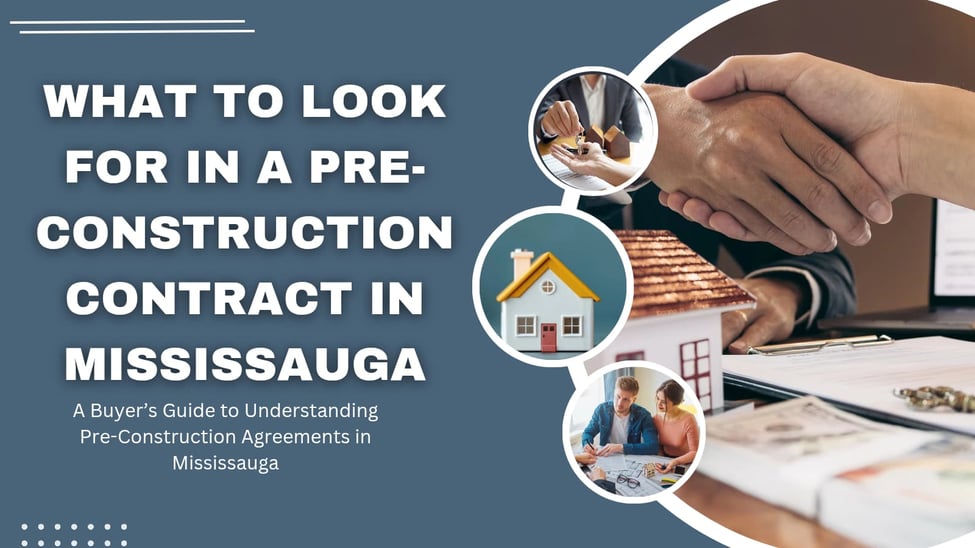Buying a pre-construction property in Mississauga can be an exciting opportunity — whether you're a first-time homebuyer, investor, or someone looking to customize a dream home from the ground up. But beneath the glossy brochures and showroom finishes lies a complex legal contract: the pre-construction Agreement of Purchase and Sale (APS).
Understanding the fine print is essential to avoid costly surprises, delays, and potential legal issues. This detailed guide will walk you through what to look for in a pre-construction contract in Mississauga, helping you make informed and confident decisions.
1. The Agreement of Purchase and Sale (APS)
The APS is the binding legal document that outlines your rights and obligations when buying a pre-construction property. Here's what to focus on:
Purchase Price and Deposit Structure
Confirm the full purchase price and whether HST is included.
Review the deposit schedule, which typically requires several payments over months or even years.
Ask whether any portions of the deposit are non-refundable under specific conditions.
Completion and Closing Dates
Contracts often contain “tentative” completion dates with the builder retaining the right to extend them.
Look for clauses related to delayed occupancy compensation and your rights if the builder repeatedly delays.
Inclusions and Exclusions
Ensure that appliances, finishes, and upgrades promised in promotional material are clearly listed.
Understand which features (e.g., parking, lockers, balconies) are included and which require additional fees.
2. Understanding Tarion Warranty Coverage
All new homes in Ontario are covered by the Tarion warranty, designed to protect buyers from construction defects and builder defaults. The key warranty coverage includes:
1-Year Warranty: Covers material and workmanship defects.
2-Year Warranty: Covers major systems (electrical, plumbing, HVAC), and water penetration through windows and roofs.
7-Year Warranty: Covers major structural defects.
Stay informed about new regulations. As of 2025, buyers are required to confirm their new home purchase with Tarion shortly after signing the APS to activate warranty protection.
3. Hidden Costs at Closing
Many buyers are surprised by additional fees that surface at final closing. These can include:
Development Charges: Municipal fees that can run into thousands of dollars.
Utility Connection Fees: Charges to connect water, gas, and electricity services.
Tarion Enrollment Fee: A mandatory cost for warranty coverage.
Legal and Administrative Fees: Payable for legal processing, title registration, and builder administration.
Occupancy Fees (for condos): Monthly rent-like payments if you move in before ownership officially transfers.
Always request that your contract includes a cap on closing adjustments wherever possible.
4. The Assignment Clause
Assignment allows you to sell the contract to another buyer before final closing. It offers flexibility, especially for investors, but comes with specific limitations:
Builders may charge assignment fees and require written approval.
Some contracts prohibit assignment altogether or impose strict conditions.
There can be tax implications, including HST payable on profits made from an assignment.
Make sure your lawyer reviews this clause in detail to avoid surprises if your circumstances change.
5. Builder Reputation and Reliability
Choosing a builder with a strong track record can reduce your risk significantly. Here’s what to investigate:
Registration and Licenses: Confirm the builder is registered to build homes in Ontario.
Previous Projects: Check timelines, quality, and resale values.
Customer Reviews and Complaints: Look for patterns in customer experiences, especially regarding delays and quality of materials.
Reliable builders often offer more transparent contracts, timely construction, and fewer disputes at closing.
6. The Cooling-Off Period
Buyers of pre-construction condos in Ontario are entitled to a 10-day cooling-off period after signing the contract. Use this time wisely:
Have a real estate lawyer review the contract for complex clauses.
Secure financing pre-approval or verify your financial capacity.
Reconsider your purchase based on contract terms and lifestyle needs.
You can cancel the agreement within this period without penalty, making it a valuable safety net for buyers.
7. Interim Occupancy vs. Final Closing (for Condos)
Understanding the difference between interim occupancy and final closing is crucial for budgeting and planning:
Interim Occupancy: You can move in, but you don’t officially own the unit yet. You’ll pay an “occupancy fee” during this phase.
Final Closing: The condo is registered, you receive the title, and your mortgage begins.
Be prepared to cover both occupancy fees and rent/mortgage payments if timelines overlap.
8. Financing a Pre-Construction Purchase
Financing pre-construction homes is different from buying resale:
Extended Timelines: Mortgage approvals are typically only valid for 90–120 days, so securing financing closer to completion is necessary.
Rate Holds: Some lenders offer rate locks for pre-construction, but conditions vary.
Builder Incentives: Builders may offer promotional mortgage rates or cashback, but read the fine print carefully.
Work with a mortgage broker experienced in pre-construction to navigate the options available.
9. Cooling Periods and Project Cancellation Clauses
In rare cases, builders may cancel entire projects due to financing, zoning, or construction delays. Your contract should clearly outline:
What happens to your deposit in the event of cancellation.
Timeframes for the return of funds.
Whether any compensation is provided.
Choose builders with minimal cancellation history to lower your risk.
10. Legal Review and Professional Advice
Never sign a pre-construction contract without a legal review. Real estate lawyers are trained to:
Identify red flags in the fine print.
Negotiate caps on hidden fees.
Ensure your rights are protected in cases of delays, design changes, or cancellations.
It’s also worth consulting a tax advisor to understand HST rebates, investment implications, and future resale taxes.
Final Thoughts
Buying a pre-construction home in Mississauga comes with many benefits — from flexible deposit plans to long-term value appreciation — but only if you’re fully aware of what you're signing up for.
A well-written contract should provide clarity, transparency, and protection for both the buyer and the builder. Don’t rush into the process. Take time to read, research, and consult professionals before committing.
By understanding the terms, anticipating costs, and working with trustworthy professionals, you can move forward with confidence and avoid common pitfalls in the pre-construction real estate journey.

